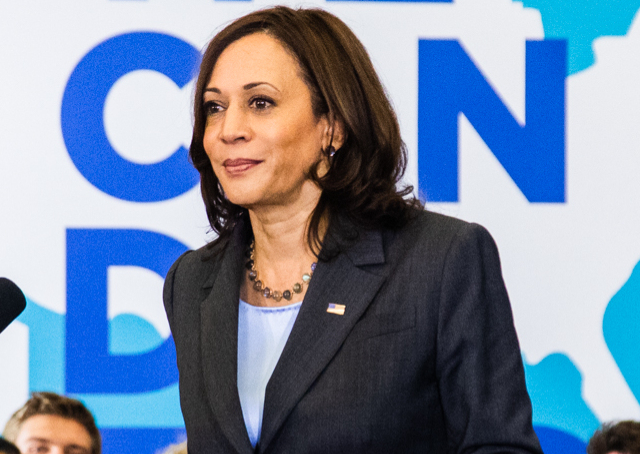Executive
Harris’ VP Pick Could Make or Break Her Chance at Beating Trump
Kamala Harris, as presumptive nominee, must make the all-important choice of running mate, and make it quickly.

In 2020, California Sen. Kamala Harris was tapped by former Vice President Joe Biden to be his running mate in what was billed as the most consequential campaign of our lifetimes. Four years later, after mounting pressure due to questions about his age and mental acuity following a disastrous debate performance, President Joe Biden has officially dropped out of the 2024 presidential race and endorsed Vice President Harris as the Democratic Party nominee. The conventional wisdom suggests that Harris will indeed secure the Democratic Party nomination given that she is the current vice president and has already been vetted as a candidate, along with rules relating to Biden-Harris campaign funds. As such, it is worth considering who may best serve her as a potential running mate.
How important is a running mate?
The choice of a running mate says a lot about the judgment of the presidential nominee and it can increase support for ticket. Political scientists Chris Devine and Kyle Kopko find that a popular pick of a vice-presidential nominee has the most influence on boosting perceptions of the president who chooses them. This would be of particular importance as Kamala Harris has a relatively high number of Americans who have not yet made up their minds about her.
Beyond the electoral effects, running mates matter because vice presidents are just one heartbeat away from the presidency, the most powerful elected position on the planet. For this reason, it is important that a presidential nominee get this choice right. In 1968, Richard Nixon, the former Republican vice president from California, picked Maryland Gov. Spiro Agnew to be his number two. Five years later, after the duo was reelected in 1972, Agnew was forced to resign the vice presidency because of corruption, and the vice-presidential office remained vacant until House Minority Leader Gerald Ford of Michigan was confirmed by Congress to take office. Ten months later, Nixon himself resigned and Ford was elevated to the presidency as America’s only nationally unelected president. As the Agnew experience demonstrates, picking a well-qualified and corruption-free individual is important.
Harris must move quickly
If Harris does indeed become the Democratic Party nominee, she will have to move quickly to vet potential running mates. The most important condition is whether the individual is qualified. Sometimes, out of desperation, nominees give short shrift to this criterion, and they pick an individual for electoral reasons, governing be damned. Arizona Sen. John McCain’s selection of Alaska Gov. Sarah Palin in 2008 is a premier example of this. The selection was widely panned, with many believing Palin was not qualified for the position.
We believe Harris has a number of highly qualified and competent individuals to choose from. Once a prospective vice-presidential contender passes the “qualified” test, nominees, particularly Democratic Party nominees, often try to find individuals who would counter-balance their own characteristics on the ticket, particularly when it comes to things like gender, race, ethnicity, and ideology. Political geography is also a factor. Just as Biden considered these factors in his groundbreaking selection of Harris, we believe she would likely choose a centrist white male who could appeal to working class voters in swing states – particularly those who believe Democrats are too liberal and Trump is too toxic.
Tim Ryan
Several Democrats have demonstrated an ability to overperform in tough races against Republicans and would likely give centrists and disaffected Republicans a safe landing spot in a race where many Americans do not like their current choices. Among the possibilities are former U.S. Rep. Tim Ryan of Ohio, U.S. Sen. Mark Kelly of Arizona, Kentucky Gov. Andy Beshear, North Carolina Gov. Roy Cooper, Pennsylvania Gov. Josh Shapiro, and Minnesota Gov. Tim Walz.
Although a dark horse, Tim Ryan checks many boxes. He served in the House for 20 years, ran for president himself in 2020 and for U.S. Senate in 2022, and has a rock-solid record of supporting and being supported by labor unions and the working class. He comes from the Mahoning Valley, the heart of steel country in Ohio and appeals to independents and Republicans who do not like Donald Trump. Although he lost his Senate bid, he outperformed the margins of both Biden in 2020 and Hillary Clinton in 2016 in increasingly red Ohio. His well-publicized challenge of Nancy Pelosi for the speakership demonstrated that he has the political courage necessary for the big stage, especially in confronting Trump and his policies. Notably, he was among the first prominent Democrats calling Biden to step aside and to pass the torch to Harris.
A Senator and two Governors
Mark Kelly has proven he can win statewide in a battleground state. He also has a resume any political candidate would be envious of: former naval aviator who piloted 39 combat missions during Operation Desert Storm in 1991, former astronaut and space shuttle pilot, author of several books, political activist on gun violence after his wife, U.S. Rep. Gabrielle Gifford was nearly assassinated and critically wounded at an event in Tucson, Arizona, in 2011, and U.S. senator from Arizona since 2020. Kelly is widely viewed as a political moderate – something that could help the ticket win over independent voters in battleground states across the country.
Though Andy Beshear governs red state Kentucky, the fact that he is popular and won reelection in 2023 in a red state is telling. Beshear is able to appeal to folks across the political spectrum and has done yeoman’s work when faced with crises such as overseeing the emergency response following the devastating tornado outbreak that killed 70 people in December 2021. Like Ryan, Beshear would appeal to independents and conservatives in the battleground states who have reservations about Donald Trump.
Roy Cooper is governor of a state that Democrats have long tried to win back since Barack Obama carried it in 2008. Cooper has shown himself to be an able political fighter by having to deal with a hostile GOP legislature and winning reelection. He is probably best known for shepherding Medicaid expansion for 600,000 low-income adults through the GOP-controlled legislature.
Two more governors
Josh Shapiro is a popular governor of perhaps the most important battleground state of them all: Pennsylvania. Shapiro is a skilled public speaker and has spent most of his adult life in elected politics: twelve years in the Pennsylvania statehouse, six years as attorney general of Pennsylvania, and now serving his second year as governor. Shapiro has shown great crossover appeal and is more popular among independents and Republicans than the typical Democrat. His actions in the immediate aftermath of the assassination attempt on former President Donald Trump at a campaign event in Butler County, Pennsylvania, have earned him praise, even from conservative media.
Tim Walz is not a name that has been bandied about with regards to the vice presidency, but it should be. A two-term governor of a Midwestern state who also served in the U.S. House, Walz, like the other candidates, would be an effective campaigner in the Midwest and swing states. His policy stances put him in line with the center of gravity of the Democratic Party.
Harris must choose wisely
If Kamala Harris is elevated as the Democratic Party nominee, one of her first and most important decisions will be to pick her running mate. It could be her most important decision and will require a great deal of thought. While many are not well known, we believe she will have several well-qualified individuals to choose from who could provide an immediate boost to a new Democratic ticket.
This article was originally published by RealClearPolitics and made available via RealClearWire.
-

 Accountability3 days ago
Accountability3 days agoWaste of the Day: Principal Bought Lobster with School Funds
-

 Civilization14 hours ago
Civilization14 hours agoWhy Europe Shouldn’t Be Upset at Trump’s Venezuelan Actions
-

 Executive2 days ago
Executive2 days agoHow Relaxed COVID-Era Rules Fueled Minnesota’s Biggest Scam
-

 Constitution3 days ago
Constitution3 days agoTrump, Canada, and the Constitutional Problem Beneath the Bridge
-

 Christianity Today13 hours ago
Christianity Today13 hours agoSurprising Revival: Gen Z Men & Highly Educated Lead Return to Religion
-

 Civilization2 days ago
Civilization2 days agoThe End of Purple States and Competitive Districts
-

 Executive1 day ago
Executive1 day agoWaste of the Day: Can You Hear Me Now?
-

 Executive5 days ago
Executive5 days agoTwo New Books Bash Covid Failures









